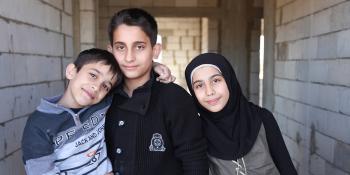Assisting with shelter
in Lebanon and Jordan
Large numbers of refugees fleeing the conflict in Syria since 2011 have put extreme pressure on the neighboring countries and, particularly, the communities in which they have sought sanctuary. This is the case in Lebanon and Jordan. Over 50 percent of the Syrian population is now displaced, and over five million of the displaced have crossed international borders and are registered refugees.
The crisis is now well into its seventh year, and Lebanon and Jordan have carried a tremendous burden. Their public services are stretched to the limit in providing for such a large increase in the population. Lebanon has received over 1.5 million Syrians, added to an existing population of 450,000 registered Palestinian refugees, as well as smaller numbers of Iraqi and other nationalities fleeing poverty and conflict in their own countries. Existing communities, already overcrowded and experiencing poverty, are now hosts to a substantial influx of refugees, placing more pressure on existing infrastructure.
What can we do to help?
Although the response from the international humanitarian community has been substantial, there are gaps, and much remains to be done. Many humanitarian organizations, having done good work since 2011, now find themselves with diminishing funding. If you wish to support our work in the Middle East, please, donate here.
Habitat for Humanity is in the process of developing its involvement in the region, mainly in Lebanon and Jordan. Whilst we have had a presence in these countries since the early 2000s, we have decided to enhance interventions in response to the Syrian Crisis.
Habitat Middle East has established a team to identify needs of the refugees and affected host communities, based in both Lebanon and Jordan. We have mapped out communities requiring priority assistance and, from early December 2017, a team of social workers and engineers starts detailed assessment of their needs. In Lebanon, the first pilot project will begin rehabilitation of substandard housing in an overcrowded and poor area of Beirut in January 2018. Another team looks into doing similar work in Jordan.
We hope that the conflict in Syria will be resolved soon, although a quick solution is by no means certain. However, what is certain, is that refugees and host communities in Lebanon and Jordan will require assistance for years to come.
By Richard Cook, Head of the Middle East Program
Donate today
Donate today
You will help upgrade refugees` homes and communities. Empower new beginnings.
Stories from Lebanon
For the seasonal appeal 2018, Financial Times journalists have visited Habitat projects in the region to encourage readers and corporate partners to donate and support our work.
Read the Financial Times stories from Lebanon:
- Beirut: when home is a refugee camp
- In their footsteps: a walk through a Beirut refugee camp
- Syrian refugee family faces bleak future as debts mount
The whole coverage from the Seasonal Appeal can be found on FT.com.
